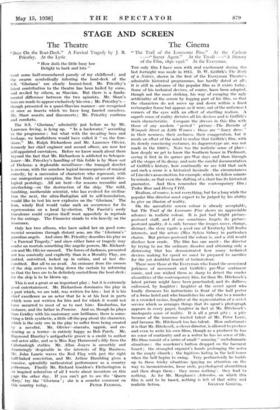STAGE AND SCREEN The Theatre
" How doth the little busy bee Delight to bark and bite "
went some half-remembered parody of my childhood ; and the swarm symbolically infesting the boat-deck of the S.S. Gloriana ' are clearly bonnet-bred. Mr. Priestley's latest contribution to the theatre has been hailed by some, and reviled by others, as Shavian. But there is a funda- mental difference between the two apiarists. Mr. Shaw's bees are made to appear exclusively his own ; Mr. Priestley's- though presented in a quasi-Shavian manner—are recognised at once as insects which we have long fancied ourselves. Mr. Shaw asserts and disconcerts ; Mr. Priestley confirms and comforts.
The S.S. Gloriana,' admirably put before us by Mr. Laurence Irving, is lying up. " In a backwater," according to the programme ; but what with the invading bees and boskage, we landlubbers would have called it " on the fore- shore." Mr. Ralph Richardson and Mr. Laurence Olivier, formerly her chief engineer and second officer, are now her self-appointed caretakers. Before we know much about them beyond the fact that Mr. Richardson is addicted to Schopen- hauer—Mr. Priestley's handling of this foible is by Shaw out of Dickens: a deplorable misalliance—the tranquil derelict is overrun, with the somehow logical inconsequence of musical comedy, by a succession of characters who represent, with one unimportant exception, the first fruits of current ideo- logical pestology. All are bent—for reasons recondite and interlocking—on the destruction of the ship. The mild, fumbling, motherable scientist, who has evolved for civilisa- tion the next, the ultra-Badoglian aid to self-immolation, would like to test his new explosive on the Gloriana.' The lean, windy Red would value such an occurrence for its repercussions on a local by-election. The Fascist's seedy truculence could express itself most appositely in reprisals for the outrage. The Financier stands to win heavily on the insurance.
Only her two officers, who have sailed her on good com- mercial occasions through distant seas, are the Gloriana's ' guardian angels. And since Mr. Priestley describes his play as " a Farcical Tragedy," and since either farce or tragedy may confer on mortals something like angelic powers, Mr. Richard- son and Mr. Olivier succeed. The forces of darkness, presented not less comically and explicitly than in a Morality Play, are jostled, outwitted, locked up in cabins, and at last dis- comfited. But all to no avail. An emissary from the owners of the ship arrives to bring down the curtain by informing us that the bees are to be definitely ousted from the boat-deck : fur the ship is to be blown up.
This is not a great or an important play ; but it is extremely good entertainment. Mr. Richardson dominates the play in a part which, we are told, was written for him ; but it is his chief excellence as an actor that he is at his best in parts which were not written for him and for which it would not have occurred to most of us to cast him : Enobarbus, for instance, and the father in Promise. And so, though he plays Sam Gridley with his customary sure brilliance, there is some- thing a little synthetic, a little off-the-peg about the character, which is the only one in the play to suffer from being created by a novelist. Mr. Olivier—staccato, uppish, and en- dearing as a terrier—is entirely happy as Bob Patch. Mr. Raymond Huntley's antipathetic grocer is a credit to author and actor alike, and so is Miss Kay Hammond's filly from the Cabstanteigh stables. Mr. Allan Jeayes is smoothly and disarmingly despicable in the interests of Big Business. Mr. John Laurie waves the Red Flag with just the right half-baked conviction, and Mr. Arthur Hambling gives a massive, splendidly untheatrical performance as a country policeman. Finally Mr. Richard Goolden's Fletherington is an inspired refutation of all I wrote about inventors on this Page the other day. If you can't get to see the Queen Mary,' try the Gloriana ; she is a sounder comment on






















































 Previous page
Previous page